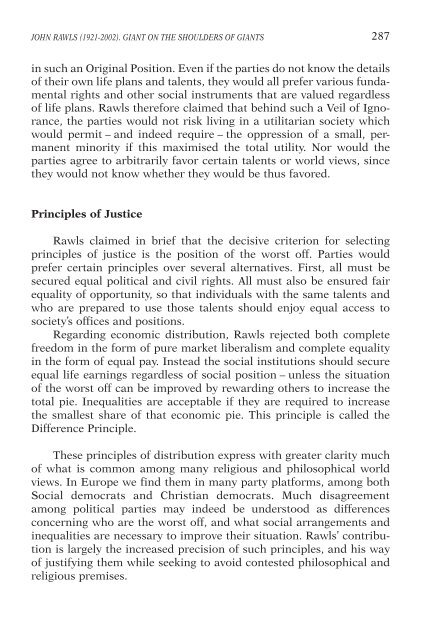- Page 1 and 2:
U N I V E R S I D A D E D O M I N H
- Page 3 and 4:
P ELA primeira vez a União Europei
- Page 5:
QUESTÕES SOBRE A EUROPA
- Page 8 and 9:
8 DIACRÍTICA -se com as Luzes 3 ,
- Page 10 and 11:
10 DIACRÍTICA pelas quais o Espír
- Page 12 and 13:
12 pessoas, é entre eles um dever-
- Page 14 and 15:
14 DIACRÍTICA seus laços brutais,
- Page 16 and 17:
16 ração das instituições europ
- Page 18 and 19:
18 DIACRÍTICA duma nova ciência -
- Page 20 and 21:
20 DIACRÍTICA é, entre as classes
- Page 22 and 23:
22 cializando à medida que se mult
- Page 24 and 25:
24 DIACRÍTICA Ora, em qualquer reu
- Page 26 and 27:
26 DIACRÍTICA rejeitado ou essenci
- Page 28 and 29:
28 DIACRÍTICA de oiro do género h
- Page 30 and 31:
30 DIACRÍTICA são; como um Super-
- Page 32 and 33:
32 DIACRÍTICA temente, na polític
- Page 34 and 35:
34 outra face do federalismo: «a u
- Page 36 and 37:
36 DIACRÍTICA çando o ímpeto de
- Page 38 and 39:
38 DIACRÍTICA hierarquia invertida
- Page 40 and 41:
40 ou o federalismo se institui, e
- Page 42 and 43:
42 retorno para o político após o
- Page 44 and 45:
44 DIACRÍTICA Victor Hugo, o grand
- Page 46 and 47:
46 DIACRÍTICA A ideia de «fratern
- Page 48 and 49:
48 DIACRÍTICA que lhes infligiram
- Page 50 and 51:
50 DIACRÍTICA ainda do culto da Hu
- Page 52 and 53:
52 DIACRÍTICA decisão rápida que
- Page 54 and 55:
54 partes de povos que têm o seu p
- Page 56 and 57:
56 Para Husserl, a verdade não tem
- Page 58 and 59:
58 DIACRÍTICA Oriente e envolvida
- Page 60 and 61:
60 DIACRÍTICA absoluta, universal,
- Page 62 and 63:
62 DIACRÍTICA (portanto a qualquer
- Page 64 and 65:
64 DIACRÍTICA mico sobre o estáti
- Page 66 and 67:
66 DIACRÍTICA como um artifício d
- Page 68 and 69:
68 DIACRÍTICA -nações (o que, à
- Page 70 and 71:
70 DIACRÍTICA Com efeito, o outro
- Page 72 and 73:
72 DIACRÍTICA e as pesquisas parti
- Page 74 and 75:
74 DIACRÍTICA de Galicia e da intr
- Page 76 and 77:
76 DIACRÍTICA lutamente necesaria
- Page 78 and 79:
78 DIACRÍTICA La existencia de est
- Page 80 and 81:
80 DIACRÍTICA de la acción adquie
- Page 82 and 83:
82 DIACRÍTICA Desde la òptica ecl
- Page 84 and 85:
84 DIACRÍTICA Tratados de Priscili
- Page 86 and 87:
86 serie de problemas, ós que, hox
- Page 88 and 89:
88 DIACRÍTICA seu papel ético-esp
- Page 90 and 91:
90 DIACRÍTICA digos, estafadores,
- Page 92 and 93:
92 DIACRÍTICA culto a Santiago en
- Page 94 and 95:
94 DIACRÍTICA xacobea), e a invent
- Page 96 and 97:
96 DIACRÍTICA Na primeira fase, an
- Page 98 and 99:
98 DIACRÍTICA E, finalmente, xa no
- Page 100 and 101:
100 DIACRÍTICA para predica-lo Eva
- Page 102 and 103:
102 DIACRÍTICA se adiviña cómo c
- Page 104 and 105:
104 DIACRÍTICA existencia dunha co
- Page 106 and 107:
106 DIACRÍTICA Conclusións que ve
- Page 108 and 109:
108 Antes de Nós, sem nós DIACRÍ
- Page 110 and 111:
110 lares, Espanha e Portugal. Na p
- Page 112 and 113:
112 das culturas portuguesa 18 e it
- Page 114 and 115:
114 DIACRÍTICA mais íntimo, que t
- Page 116 and 117:
116 DIACRÍTICA tude mundana, as su
- Page 118 and 119:
118 DIACRÍTICA sobre a vida social
- Page 120 and 121:
120 DIACRÍTICA mas, para operar es
- Page 122 and 123:
122 DIACRÍTICA Mais ou menos, assi
- Page 124 and 125:
124 DIACRÍTICA 1988) texto que, co
- Page 126 and 127:
126 DIACRÍTICA tencia y así abrir
- Page 128 and 129:
128 DIACRÍTICA mentos, e participa
- Page 130 and 131:
130 2. La agonía de Europa DIACRÍ
- Page 132 and 133:
132 DIACRÍTICA natureza humana. Ne
- Page 134 and 135:
134 DIACRÍTICA solido dedicarse a
- Page 136 and 137:
136 DIACRÍTICA humana. Se o sistem
- Page 138 and 139:
138 DIACRÍTICA «Enfermedad que ba
- Page 141 and 142:
Portugal na «balança da Europa»
- Page 143 and 144:
PORTUGAL NA «BALANÇA DA EUROPA»
- Page 145 and 146:
PORTUGAL NA «BALANÇA DA EUROPA»
- Page 147 and 148:
PORTUGAL NA «BALANÇA DA EUROPA»
- Page 149 and 150:
PORTUGAL NA «BALANÇA DA EUROPA»
- Page 151 and 152:
PORTUGAL NA «BALANÇA DA EUROPA»
- Page 153 and 154:
PORTUGAL NA «BALANÇA DA EUROPA»
- Page 155 and 156:
PORTUGAL NA «BALANÇA DA EUROPA»
- Page 157 and 158:
PORTUGAL NA «BALANÇA DA EUROPA»
- Page 159 and 160:
PORTUGAL NA «BALANÇA DA EUROPA»
- Page 161 and 162:
PORTUGAL NA «BALANÇA DA EUROPA»
- Page 163 and 164:
PORTUGAL NA «BALANÇA DA EUROPA»
- Page 165 and 166:
PORTUGAL NA «BALANÇA DA EUROPA»
- Page 167 and 168:
PORTUGAL NA «BALANÇA DA EUROPA»
- Page 169 and 170:
PORTUGAL NA «BALANÇA DA EUROPA»
- Page 171 and 172:
PORTUGAL NA «BALANÇA DA EUROPA»
- Page 173 and 174:
PORTUGAL NA «BALANÇA DA EUROPA»
- Page 175 and 176:
PORTUGAL NA «BALANÇA DA EUROPA»
- Page 177 and 178:
PORTUGAL NA «BALANÇA DA EUROPA»
- Page 179 and 180:
PORTUGAL NA «BALANÇA DA EUROPA»
- Page 181 and 182:
PORTUGAL NA «BALANÇA DA EUROPA»
- Page 183 and 184:
A identidade de Europa: Unha reflex
- Page 185 and 186:
A IDENTIDADE DE EUROPA 185 no exerc
- Page 187 and 188:
A IDENTIDADE DE EUROPA 187 radicar
- Page 189 and 190:
A IDENTIDADE DE EUROPA 189 súas pr
- Page 191 and 192:
A IDENTIDADE DE EUROPA 191 á praxi
- Page 193 and 194:
A IDENTIDADE DE EUROPA 193 fin de c
- Page 195 and 196:
A IDENTIDADE DE EUROPA 195 la razó
- Page 197 and 198:
A IDENTIDADE DE EUROPA 197 las naci
- Page 199 and 200:
A IDENTIDADE DE EUROPA 199 A miña
- Page 201:
A JUSTIÇA EM QUESTÃO
- Page 204 and 205:
204 DIACRÍTICA dual. Este tipo de
- Page 206 and 207:
206 DIACRÍTICA A concepção de ig
- Page 208 and 209:
208 DIACRÍTICA as capacidades e mo
- Page 210 and 211:
210 DIACRÍTICA regime legal discri
- Page 212 and 213:
212 DIACRÍTICA superiores. O próp
- Page 214 and 215:
214 DIACRÍTICA igualdade de oportu
- Page 216 and 217:
216 filosóficos. É necessário re
- Page 218 and 219:
218 DIACRÍTICA By 1998, the top on
- Page 220 and 221:
220 DIACRÍTICA citizen’s birthri
- Page 222 and 223:
222 DIACRÍTICA Doesn’t the $80,0
- Page 224 and 225:
224 DIACRÍTICA of their joint stak
- Page 226 and 227:
226 is denied a fair start, how can
- Page 228 and 229:
228 DIACRÍTICA creative program he
- Page 230 and 231:
230 A justiça política DIACRÍTIC
- Page 232 and 233:
232 DIACRÍTICA todo cum certo vaga
- Page 234 and 235:
234 DIACRÍTICA havé-las senom ent
- Page 236 and 237: 236 DIACRÍTICA A respeito do escra
- Page 238 and 239: 238 DIACRÍTICA que aprender do seu
- Page 240 and 241: 240 Bibliografia Referimos, a segui
- Page 242 and 243: 242 CALVO MARTÍNEZ, T.: Aristótel
- Page 245 and 246: Justiça e Poder nos Tribunais Plen
- Page 247 and 248: JUSTIÇA E PODER NOS TRIBUNAIS PLEN
- Page 249 and 250: JUSTIÇA E PODER NOS TRIBUNAIS PLEN
- Page 251 and 252: JUSTIÇA E PODER NOS TRIBUNAIS PLEN
- Page 253 and 254: JUSTIÇA E PODER NOS TRIBUNAIS PLEN
- Page 255 and 256: JUSTIÇA E PODER NOS TRIBUNAIS PLEN
- Page 257 and 258: JUSTIÇA E PODER NOS TRIBUNAIS PLEN
- Page 259 and 260: JUSTIÇA E PODER NOS TRIBUNAIS PLEN
- Page 261 and 262: JUSTIÇA E PODER NOS TRIBUNAIS PLEN
- Page 263 and 264: JUSTIÇA E PODER NOS TRIBUNAIS PLEN
- Page 265 and 266: JUSTIÇA E PODER NOS TRIBUNAIS PLEN
- Page 267 and 268: JUSTIÇA E PODER NOS TRIBUNAIS PLEN
- Page 269 and 270: JUSTIÇA E PODER NOS TRIBUNAIS PLEN
- Page 271 and 272: JUSTIÇA E PODER NOS TRIBUNAIS PLEN
- Page 273: JUSTIÇA E PODER NOS TRIBUNAIS PLEN
- Page 277 and 278: Centenário: Karl Popper 2002 JOÃO
- Page 279 and 280: CENTENÁRIO: KARL POPPER 2002 279 J
- Page 281 and 282: CENTENÁRIO: KARL POPPER 2002 281 r
- Page 283: CENTENÁRIO: KARL POPPER 2002 283 d
- Page 288 and 289: 288 Justifying Morality In addition
- Page 290: 290 DIACRÍTICA politically, social











![Programa [pdf] - cehum - Universidade do Minho](https://img.yumpu.com/17305425/1/190x135/programa-pdf-cehum-universidade-do-minho.jpg?quality=85)




